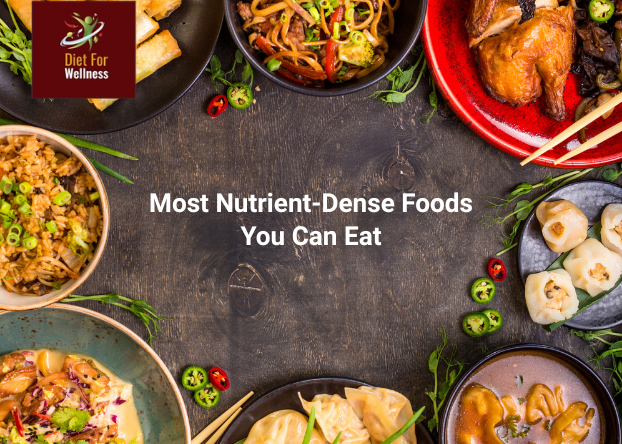Most Nutrient-Dense Foods You Can Eat

Shifting your diet to focus on nutrient-dense foods is a powerful step toward better health. These foods are packed with essential vitamins and minerals (micronutrients), providing the nourishment your body needs while being naturally low in sugar, sodium, unhealthy fats, and excessive calories. Consuming these micronutrients through whole foods ensures optimal absorption and can significantly lower your risk of chronic diseases.
The Benefits of a Varied, Nutrient-Rich Diet
A diverse intake of nutrient-dense foods is key to getting a full spectrum of vitamins and minerals. Naturally rich sources include a wide array of fruits and vegetables, lean proteins like fish and poultry, whole grains, dairy products, legumes, nuts, and seeds.
Most people commonly consume foods that are high in calories but deficient in vital micronutrients. These diets often include added sugars, excessive sodium, and saturated or trans fats, contributing to weight gain and increasing the risk of serious health conditions such as type 2 diabetes and heart disease.
Making Nutrient-Rich Food Choices
- Grains
Opt for whole-grain foods, which are naturally low in fat and abundant in fiber and complex carbohydrates. These qualities help you feel full longer, potentially preventing overeating. When selecting grain products, look for “whole” as the first ingredient (e.g., “whole wheat flour,” “whole oat flour”) and aim for at least 3 grams of fiber per serving. Be aware that some enriched flours may have fiber but lack the overall nutrient density of whole grains.
- Rolled or steel-cut oats
- Whole-wheat pasta
- Whole-wheat tortillas
- Whole-grain (wheat or rye) crackers, breads, and rolls
- Brown or wild rice
- Barley, quinoa, buckwheat, whole corn, and cracked wheat
1. Fruits and Vegetables
Fruits and vegetables are inherently low in fat and add essential nutrients, flavor, and vibrancy to your meals. Prioritize colorful options, especially those that are orange and dark green.
- Broccoli, and cauliflower
- Leafy greens such as cabbage
- Dark, leafy greens, such as spinach
- Squash, carrots, sweet potatoes, turnips, and pumpkin
- Green beans, bell peppers
- Apples, plums, mangos, papaya, pineapple, and bananas
- Blueberries, strawberries, cherries, pomegranates, and grapes
- Citrus fruits, such as grapefruits and oranges
- Peaches, pears, and melons
- Tomatoes and avocados
2. Meat, Poultry, Fish, and Beans
Poultry– Chicken breasts are an excellent, low-fat, high-protein poultry option. Always remove the skin and external fat before cooking. Baking, broiling, grilling, and roasting are the healthiest preparation methods for poultry.
Fish– Fresh fish should appear moist and clear in color, have a clean scent, and firm, springy flesh. If fresh options aren’t available, choose frozen or low-sodium canned fish. Wild-caught oily fish are top sources of omega-3 fatty acids. Poaching, steaming, baking, or broiling are the healthiest ways to prepare fish.
Beans and Other Non-Meat Sources- Non-meat protein sources can also be highly nutrient-dense. Consider incorporating servings of beans, peanut butter, other nuts, or seeds into your diet.
- Ground chicken
- Wild-caught oily fish
- White fish
- Shrimp, and lobster (prepared without added fat)
- Legumes, such as beans, lentils, and chickpeas
- Seeds and nuts, including nut butters
3. Dairy and Dairy Substitutes
Opt for skim milk, low-fat milk, or enriched milk substitutes. In recipes and coffee, try using evaporated skim milk instead of cream. Choose low-fat or fat-free cheese varieties.
- Low-fat, skim, nut, or enriched milk (e.g., soy or rice milk)
- Skim ricotta cheese (in place of cream cheese)
- Low-fat cottage cheese
- String cheese
- Plain nonfat yogurt (as a substitute for sour cream)
Important Considerations
You’ll often find most nutrient-rich foods around the perimeter (outer aisles) of the grocery store. The ideal amount of nutrient-dense foods for you depends on your individual daily calorie needs.
Questions to Discuss with Your Doctor
- What are some easy ways to integrate these foods into my daily meals?
- How can I make sure that I’m getting enough nutrient-rich foods if I follow a strict diet, such as vegetarian or vegan?
- Are supplements or multivitamins necessary to increase my nutrient intake?
